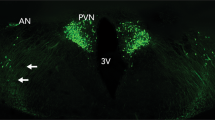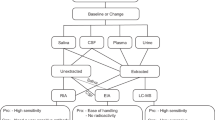Conclusions
-
1.
The neuropeptide oxytocin exerts a pronounced neurotropic effect.
-
2.
The antidepressive effects of oxytocin revealed experimentally were confirmed in the treatment of the depressive syndrome in people.
-
3.
The administration of oxytocin to treat persons with schizophrenia showed that it can be used to normalize the emotional status, to eliminate asthenic and apathetic states, as well as a psychic energizer.
Similar content being viewed by others
Literature cited
E. Costa and M. Trabucchi (eds.), Neural Peptides and Neuronal Communication, Raven Press, New York (1980).
R. M. Bulaev and K. S. Raevskii, Usp. Fiz. Nauk,13, No. 2, 65 (1982).
R. G. Bolles and M. S. Fanselow, Ann. Rev. Psychol.,33, 87 (1982).
A. I. Prange, P. T. Loosen, and I. C. Wilson, in: Neuropsychopharmacology, Oxford (1979), pp. 151–161.
A. I. Kastin, C. A. Sandman, A. V. Schally, et al., Clin. Neuropharmacol.,3, 133 (1978).
W. M. Verhoeven and H. M. Praag, in: Psychoneuroendocrinology and Abnormal Behavior, Basel (1980), pp. 20–45.
B. Skinner, The Behavior of Organisms, New York (1938), p. 368.
S. I. Gal'perin and A. E. Tatarskii, Methods for Investigating Higher Nervous Activity in Man and Animals [in Russian], Moscow (1973).
A. V. Val'dman, N. A. Bondarenko, M. M. Kozlovskaya, et al., Byull. Éksp. Biol., No. 4, 49 (1982).
V. I. Medvedev, V. D. Bakharev, O. A. Kaurov, et al., Zh. Evol. Biokhim.,17, No. 1, 41 (1981)
V. I. Medvedev, V. D. Bakharev, and O. A. Kaurov, Fiziol. Zh. SSSR, No. 10, 1322–1329 (1982).
S. Ya. Rubinshtein, Experimental Methods in Pathopsychology and Their Application in Clinical Practice [in Russian], Moscow (1970).
E. T. Dorofeeva, in: Mental Illnesses [in Russian], Leningrad (1970), pp. 319–327.
V. I. Medvedev, G. A. Akimov, and V. D. Bakharev, Fiziol. Cheloveka,7, No. 4, 593 (1981).
G. A. Akimov, V. I. Medvedev, N. V. Stepovik, et al., Sov. Med., No. 1, 49 (1982).
G. A. Akimov, V. I. Medvedev, V. D. Bakharev, et al., Zh. Nevropatol. Psikhiatr., No. 12, 1787 (1980).
V. P. Buyanov, in: Problems of Psychiatry and Neuropathology [in Russian], Leningrad (1976), No. 15, pp. 223–228.
G. M. Rudenko, Zh. Nevropatol. Psikhiatr., No. 11, 1708 (1969).
D. DeWeid and D. H. C. Versteeg, Fed. Proc.,38, 2348 (1979).
H. Schulz, G. L. Kovacs, and C. Telegdy, Eur. J. Pharmacol.,57, 185 (1979).
L. G. Kovacs and C. Telegdy, Acta Pharmacol. Hung.,48, Suppl. 1, 70 (1978).
B. Bohus, Symbioses,11, 47 (1979).
G. T. B. Wimersma and D. DeWeid, Acta Psychiatr. Belg.,80, 721 (1980).
Author information
Authors and Affiliations
Additional information
Translated from Problemy Endokrinologii, Vol. 30, No. 2, pp. 37–41, March–April, 1984.
Rights and permissions
About this article
Cite this article
Bakharev, V.D., Tikhomirov, S.M. & Lozhkina, T.K. Psychotropic properties of oxytocin. Neurosci Behav Physiol 16, 160–164 (1986). https://doi.org/10.1007/BF01186517
Received:
Issue Date:
DOI: https://doi.org/10.1007/BF01186517




